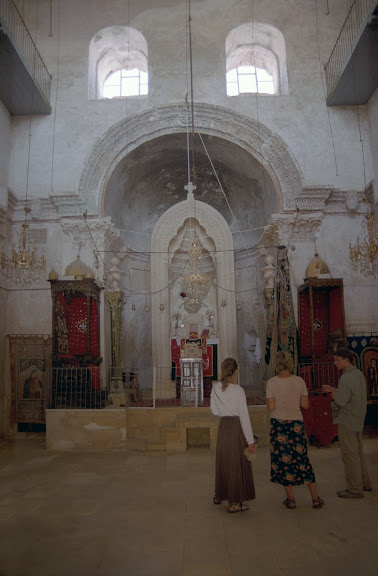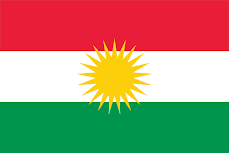
- WWW.KRG.COM ARTICLE -
By Kenneth R. Timmerman
The Kurdish regional government in Northern Iraq is providing a safe haven to several thousand Iraqi Christians who have fled persecution in other parts of the country, government officials and local pastors told Newsmax.
Unlike refugee camps set up for some 100,000 Shia Muslims fleeing attacks from Sunnis, which are closely monitored by Kurdish security forces, Christians have been encouraged to live anywhere.
“Christians in Iraq need special attention, because they’ve been suffering because they are Christians,” Deputy Prime Minister Omar Fattah told Newsmax in an exclusive interview in Erbil. “Maybe we give some instructions to others where they can go, but to Christians, never, because we are not afraid they will be terrorists.”
Some have been given government land and building materials to construct a house. Others have rented homes from friends, or are being put up in temporary shelters thanks to local churches and international donors.
“Those people are our citizens, and when they are coming to Kurdistan they are most welcome, and we will provide them with all possible assistance,” the Kurdish deputy premier said.
Since U.S.-led forces toppled Saddam Hussein’s regime in April 2003, around 2,000 Christian families have moved into Ainkawa, a historic Christian town on the outskirts of the Kurdish capital, Erbil.
“Most people came when the terrorists told them they must pay the jizya or they will be killed,” Ainkawa mayor, Fahmi Mehti Soltaqi, told Newsmax, referring to a "protection tax" levied on non-Muslims according to Shari'a law.
Scores of refugees interviewed by Newsmax here and in Amman, Jordan, told harrowing stories of receiving death threats from al-Qaida thugs delivered to their homes in Baghdad.
The terrorists told them that as Christians, they had no right to remain in a Muslim land without submitting to Muslim rule. To escape the jizya, some Christian refugees said they were told they must marry one of their daughters to a Muslim. Instead, when they could, they fled.
Tragedy lurks just beneath the surface, even in this peaceful part of Iraq.
Mayor Soltaqi’s new office assistant, Eghraa Ramzi, is an example. She fled with her daughter from her home in the Karrada district of Baghdad in June 2007, after Islamic terrorists said they would kill them if they didn’t pay the jizya. Now she handles computer services for the municipality.
Rita Yuel is another. If you met her on the street, you would think she was just an attractive 23-year-old university student. But when you talk to her and learn her story, unmistakeable sadness emerges.
Rita used to live in Daura, a Christian neighborhood of Baghdad, until the Muslim terrorists drove her and her sisters and others to flee in August 2006. “The terrorists were torturing people in the house next door,” she said.
Her father stayed behind to work and guard the house. Last April, he promised to join his family in the north for the Easter holidays, but he never arrived.
Rita and her mother learned later that he and two other Christians had been abducted at gunpoint by masked men at a roadside teahouse on the outskirts of Baiji, midway between Baghdad and the north. “He was kidnapped one year and eight days ago, and we don’t know where he is or if he is still alive. We hope that he will return,” she said.
The governor of Irbil Province, Nawzad Hadi Mawlood, recalls the heady days just after the liberation of Iraq in 2003, when Iraqis from all ethnic backgrounds were suddenly free from decades of darkness.
“The terrorists destroyed the dream of the Iraqi people,” Governor Mawlood told Newsmax. “Christians had no militia to protect themselves. They were easy targets,” he explained. “Today, for them, Kurdistan is an option.”
His government has opened special schools to meet the needs of Christian refugees who speak Arabic and not Kurdish, the official language here. “We have done everything we can to integrate Christians into Kurdish society,” he said.
“We are not going to refuse them. They are Iraqi. We know what they are running from.”
On Sundays, the many Christian churches in Ainkawa — some of them dating from the 9th century — are packed with worshippers. Families walk the streets without fear. Restaurants and shops are open. Even more importantly, it is the only place in Iraq where Muslims can adopt the Christian faith without fear, pastors and government officials tell Newsmax.
“All Iraq should be like Ainkawa,” said William Warda, the president of the Hammurabi Organization for Human Rights, an Iraqi group advocating for Christian political rights. But even in this safe haven, once darkness falls, metal barriers block the streets, guards with AK-47s emerge to protect the churches, and Kurdish security police control traffic trying to enter the area.
Asked about this, Deputy Prime Minister Fattah was resigned. “We are afraid of the terrorists, too.”
Terrorist groups are constantly probing the layered security of the Kurdish region to find weak points, he explained. “If they see a church in a Christian area, they see that it is a peaceful area and perhaps they will attack.”
One former Royal Marine, Dan F., who manages a local security company that caters to expatriates visiting or working in the area, lives in a heavily guarded compound in Ainkawa.
Jersey barriers, gates, barbed wire, and armed guards posted at regular intervals impede access to his compound. And yet, despite the precautions, Dan wears a Glock 9 millimeter at all times and refuses to walk the streets. "If you want to walk around, wait a few weeks then go home, and you’ll have a 100 percent chance of nothing happening to you,” he says.
For all the problems and the tenuous security situation, no one here in the Kurdish north has any regrets about the U.S.-led invasion. “I’ve never been to paradise,” said Fattah, “but the difference between today and Saddam’s time is heaven and hell.”
Fattah’s only fear is that American troops will leave too early, before the work is done. “Mr. Bush has not only helped Iraq, he has helped the American people as well,” he said. “He took the fight against terrorism from inside America, to outside the country. If he hadn’t done that, terrorist attacks would have continued inside America.”
U.S. troops must stay in Iraq until they reach the goal of helping Iraqis achieve a democratic federal state. “We believe Iraq can become a base for democracy in the region,” he said.
In Washington and in much of the U.S. media, such dreams are derided as the fantasies of neo-conservatives.
But here on the ground in Kurdistan, which even today commemorates the 21st anniversary of a chemical weapons attack by Saddam Hussein that massacred thousands of Kurds, this hope remains alive.
--
Kenneth R. Timmerman was nominated for the 2006 Nobel Peace Prize along with John Bolton for his work on Iran. He is Executive Director of the Foundation for Democracy in Iran, and author of Countdown to Crisis: the Coming Nuclear Showdown with Iran (Crown Forum: 2005).





















